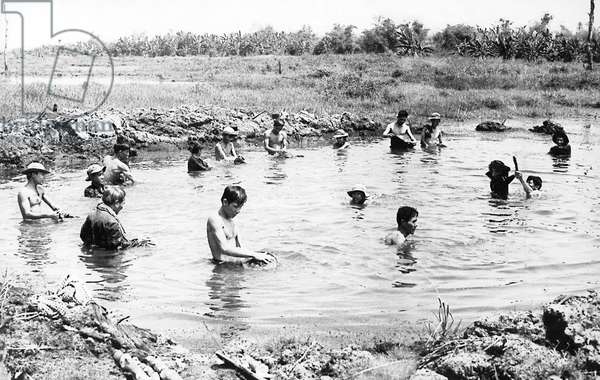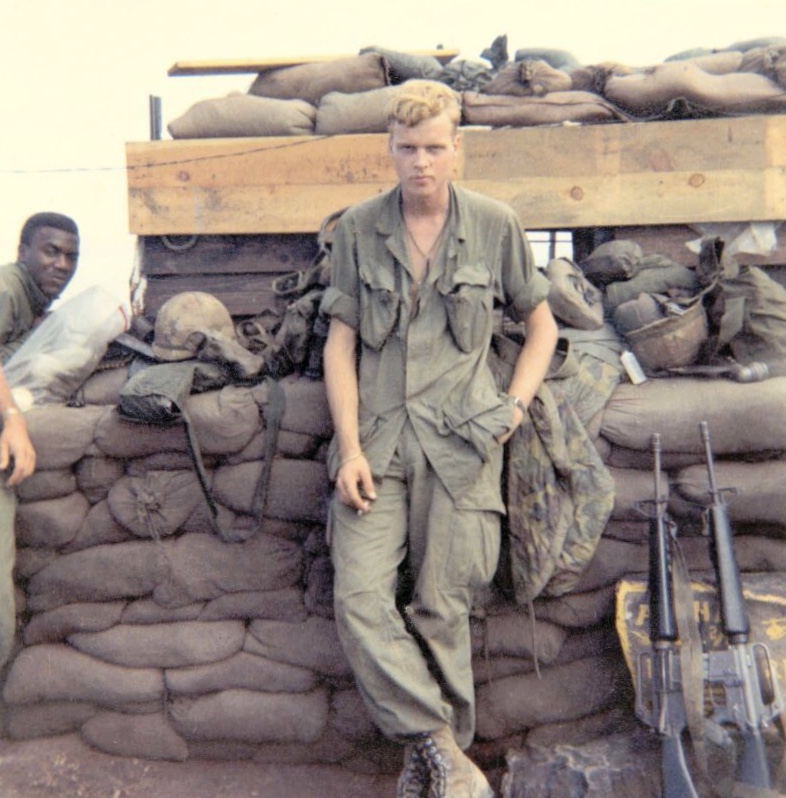Michael Dow is a Vietnam veteran from York, Maine. He was born on July 31, 1949 and was originally training to be an electrician at a vocational school in Portland. However, after his friend was drafted into the army, he decided to volunteer for the draft the August after he turned 19. This was so he could both have certainty over his future, and have more agency over his placement within the army. After four months of training at Fort Dix and Fort Polk (now named Fort Jackson), where he received both basic and advanced infantry training, Michael was shipped off to Vietnam in January 1969.
Michael was not assigned to a unit immediately, and was shifted around doing manual labor at the airbase of Bien Hoa for the first week of his deployment. Eventually, despite his infantry training, he was assigned to be the driver for the Lieutenant Colonel of the 71st transportation battalion located in Long Binh, around 20 km north of Saigon.

Badge of the 71st Transportation Battalion

Long Binh Army Base, 1967
Three months later he was assigned to the First Cavalry Division, specifically Company A, 2nd Battalion, 12th Cavalry. At the time the First Cavalry Division was an airmobile division, relying on helicopters as its primary mode of transportation. They were at the forefront of much of the war, and took the most casualties of any US division over the course of the entire war.

First Cavalry Division Badge
The First Cavalry Division’s mission in Vietnam was to “find, fix, and destroy enemy forces using maneuver to concentrate and sustain combat power”. This led to them being heavily involved in many of the deadliest parts of the war, including the secret invasion of Cambodia in 1970, which happened shortly after Michael had left the division. They were also the first part of the army to use helicopters as their primary mode of transportation, having first adopted them in 1963. This became the enduring image of the Vietnam War. The film, Apocalypse Now, actually features the First Cavalry Division, although it was the 9th Cavalry Regiment, instead of Michael’s 12th Cavalry Regiment.

First Cavalry Division in Apocalypse Now
Michael’s battalion was stationed at Landing Zone Grant, which was located 11 km northeast of Nui Ba Den, or Black Virgin Mountain. This was a very important strategic location, as the mountain was one of the only areas of high ground around the Mekong Delta, and was near a key part of the Ho Chi Minh Trail.

Radio Site at the top of Black Virgin Mountain

The mountain was riddled with caves and the surrounding area was an extremely dense jungle. Michael described it as being equivalent to standing under an umbrella, and having to cut his way through the thicket with a machete. This made it ideal conditions for the Viet Cong to hide out there.
These conditions were also perfect for disease to spread. As Michael put it “Just sopping wet, wet all the freaking time. The temperature was very high, the humidity was very high, and it was just filthy.”. Being away from base camp for 25 days also meant that proper hygiene was nearly impossible, and the patrols would usually bathe in B-52 bomb craters that were filled with water that “always looked like skim milk”. In addition to all of this there were the constant bugs and leeches that soldiers had to deal with.

People bathing in a B-52 crater
Michael’s specific company was a recon company, who would search for any Viet Cong bases in the area and attempt to eliminate them. This consisted of 25 days out in the jungle, with helicopter supplies arriving every three days, followed by five days back at the base.
Michael’s company had already taken heavy casualties by the time he was assigned to them. They were down to 60% strength, as their previous officer had specifically sought out contact with the enemy. That officer had died shortly before Michael joined from a shot to the back of the head during a fire fight, leading to the company being investigated. This meant that the new officer in charge of the company led them into a lot less combat.

Michael Dow at LZ Grant, 1969

Scabbard made of bamboo made by Michael Dow
After a few months in the recon battalion, Michael fell ill with both a fungal infection in his legs and the flu. He was transported back to Saigon for medical leave and remained there for another month or so. At that point, he was able to cash in on 2 seven day R and Rs, and traveled to Australia.

Mild case of Ringworm
Following this, Michael spent the last three months of his deployment in California working as a driver once again. He had been able to apply for the Early Out program after being informed about it by his friend who had entered officer training. He was registered as a seasonal employee by a different friend who was still in Maine.
Now Michael Dow still lives in York, Maine. He has a woodshop and works on the York Historical Commission, and helped perform research for the town’s war memorial banners.

One of the veteran memorial banners Michael Dow helped create
In his story Michael primarily focused on a few topics. The first was about taking advantage of opportunities. He emphasized that he took advantage of every opportunity that he had in order to get out of Vietnam early. Michael was able to remain in country for longer because he signed up for advanced infantry training. He was able to avoid direct combat for longer by becoming a driver for the transportation battalion. This experience also helped him become a driver again after his medical leave, and helped him transfer to California instead of remaining in Vietnam.
The second point that Michael emphasized in the interview was the disconnect between the leaders and officers and the average soldier. As he put it “they (the officers) were trying to kill you. They were doing more to kill you than the NVA, or at least as much to do as the NVA were doing. And so you really were battling on two fronts.”. Michael constantly talked about the incompetency of the army. From the fact that they didn’t know where to put him for the first week he was in Vietnam, to glory hound officers that sought out combat regardless of the resulting casualties. It lead to him developing a deep distrust in the political class and the US government as a whole.
Additional Reading:
First Cavalry Division History